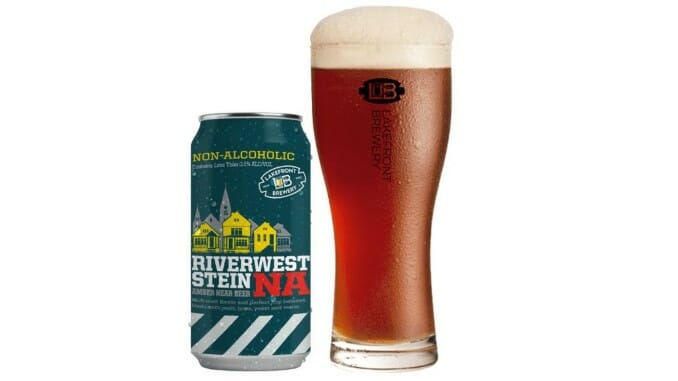Lakefront Brewery Riverwest Stein Non-Alcoholic Beer
Photos via Lakefront Brewery
Milwaukee’s Lakefront Brewery is known for a handful of things. First of all, for being one of the elder statesmen of the Midwestern/Wisconsin beer scene, having been in operation since 1987, producing a wide variety of American and Continental (especially German) beer styles. Secondly, for being an innovator when it came to firsts in beer labeling/certification, being the first to produce a bottled fruit beer (Lakefront Cherry Lager, 1992), an organic beer (Organic ESB, 1996), and gluten-free beer (New Grist, 2007). And third, Lakefront is of course known for its classic brewery tour, which the company humbly labels as “America’s favorite.” As someone who has been on said tour years ago, it’s a reputation well earned.
One thing Lakefront has never been known for, though, is non-alcoholic beer. That has now changed, with the introduction of Riverwest Stein NA, a non-alcoholic amber lager. It’s a move that acknowledges the NA beer zeitgeist—still a tiny fraction (less than 1%) of the overall beer market, but still growing in a time when all the rest of beer is shrinking—but what makes it particularly interesting to me is the choice to present this new NA beer as a version of the brewery’s long-cherished flagship lager, Riverwest Stein.
It’s a choice that is easy to label as either sensible and risky, depending on one’s perspective. When most older, regional craft breweries have developed a non-alcoholic beer brand, they’ve started from the ground up, designing that beer from scratch. One can only assume this protects the brewery from some degree of criticism that their NA beer “doesn’t taste right” in comparison with a flagship version containing alcohol. There are obvious benefits to the name recognition of taking your 34-year-old flagship and turning that into an NA brand, but the pitfalls are also significantly more apparent. That Lakefront chose to do so with Riverwest Stein suggests they’re quite confident that the new, NA version (which is supposedly the same recipe, sans alcohol) can still stand up to that scrutiny. It’s easy to imagine the brewery having high hopes for this one potentially becoming a major brand on a regional level, especially if NA beer continues to grow at a regular pace.
But when all is said and done, how does Riverwest Stein NA measure up? Let’s get to tasting, and find out.